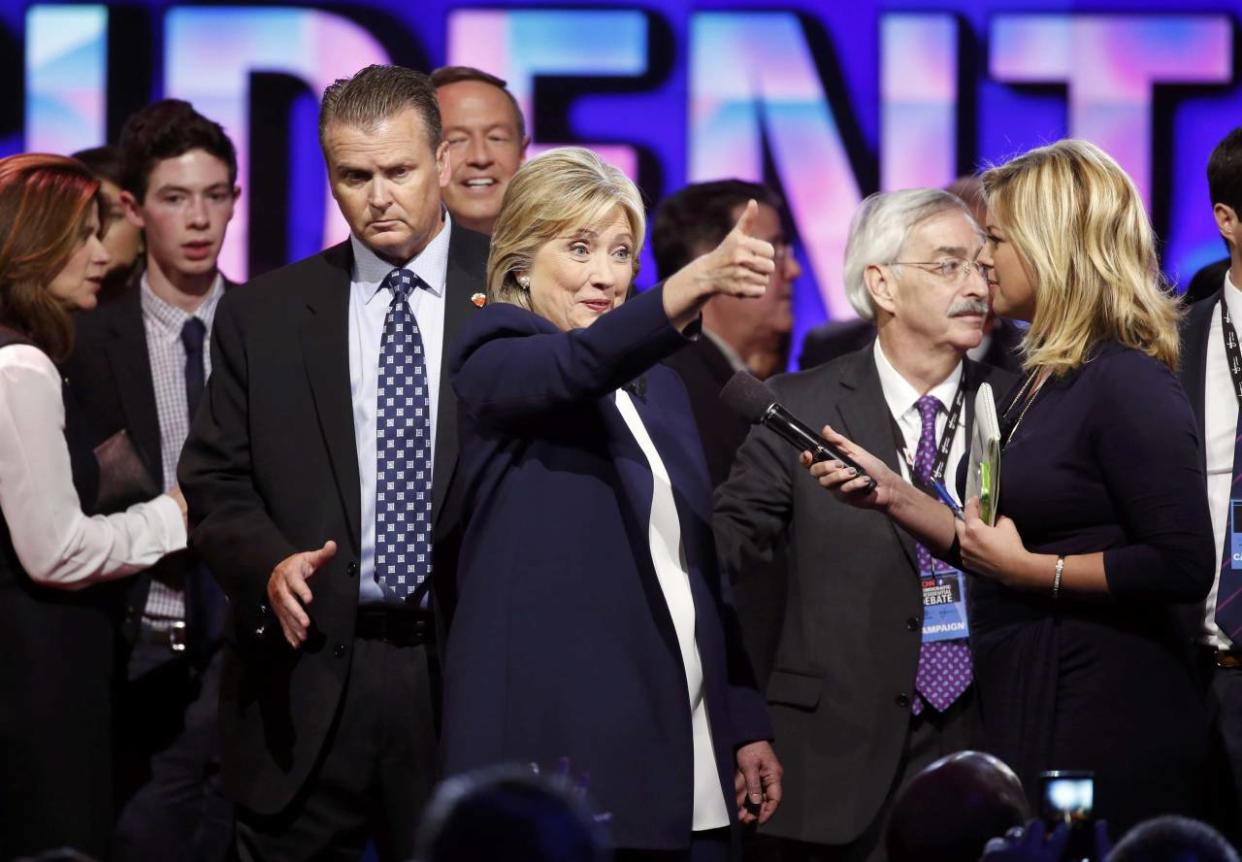Republicans see advantage as Sanders pulls Clinton to the left

Hillary Clinton gives a thumbs-up to supporters at the end of the first Democratic candidates’ debate of the 2016 campaign, in Las Vegas on Oct. 13. (Photo: Lucy Nicholson/Reuters)
Republicans rolled their eyes Wednesday at the idea that Hillary Clinton’s first debate performance was a virtuoso act that caught them by surprise.
“I think the D.C. pundit class might be overreacting a bit to what was little more than a solid debate performance against minor league pitching,” said Brad Dayspring, who worked for a super-PAC that was supporting Wisconsin Gov. Scott Walker until he dropped out of the race.
Dayspring’s comments mirrored what several other operatives working for top GOP presidential candidates said off the record. The Republicans said that they have not underestimated Clinton’s toughness, experience and poise, which was on full display Tuesday evening in Las Vegas.
“I always expected she would be tough. Anyone who thought otherwise was fooling themselves,” said an aide to one Republican candidate. “But boy, is their field weak. [Former Maryland Gov. Martin] O’Malley would be the 14th or 15th best person in our field.”
But the debate did illustrate some ways, Republicans said, in which the Democratic primary is opening up new lines of attack on Clinton in the general election. Primarily, they said, Vermont Sen. Bernie Sanders is pulling Clinton to the left on issues such as trade, immigration, energy and guns.
And on issues like trade, Clinton has now changed her position on President Obama’s Trans-Pacific Partnership, which she praised when she was Secretary of State. The switch looks transparently political and raises issues of trust and authenticity that have long dogged Clinton.
SLIDESHOW: First Democratic debate >>
There is also the issue of the Keystone Pipeline, which would import oil from Canada. Whether Clinton flip-flopped on the proposed project or not, she has come down firmly against it now. That may please voters for whom climate change is a top priority, but it may not satisfy moderates who think the U.S. should be doing everything it can to get off its decades-old reliance on oil from the Middle East.
On immigration, Clinton said Tuesday night that she favored allowing undocumented immigrants to purchase health insurance through exchanges created by the federal government’s Affordable Care Act, and she also favored allowing the children of undocumented immigrants to pay in-state tuition at universities.
And on guns, Clinton was aggressively in favor of increased controls on firearms, in response to the ongoing trend of mass shootings across the country, most recently in Oregon. She called out the National Rifle Association and said she opposed a bill that Sanders supported protecting gun shops from prosecution.
The assumption by Republican operatives is that all these positions could do damage to Clinton in key general election swing states. Whether that claim is backed up by data is harder to assess.
By and large, though, Republicans responded to the Democratic debate with a yawn. It “changed nothing,” said one presidential campaign aide. “[It] maybe woke up some in the party to the fact that she is not as weak as people think.”
“Depending on where [the] country is [a year from now] she might regret how wholeheartedly she embraced Obama. But that was probably inevitable anyway,” the aide said.
There was one other criticism of Clinton that began to surface the day after the debate. Near the end of the two-hour event, CNN’s Anderson Cooper asked each candidate, “Which enemy are you most proud of?”
Clinton responded: “Well, in addition to the NRA, the health insurance companies, the drug companies, the Iranians,” she said, and then paused and added one more, “Probably the Republicans.”
The line got applause in the hall, but it also illustrated one of the points that Obama’s own campaign advisers had used against her in the 2008 election.
“She embodies trench warfare vs. Republicans, and is consumed with beating them rather than unifying the country and building consensus to get things done,” Obama’s campaign wrote in an internal memo that surfaced only this week in a report by the New Yorker’s Ryan Lizza.
Of course, with the Republican party’s favorability rating at 32 percent, perhaps wanting to defeat the GOP is not the vulnerability that Clinton’s enemies once thought it was.


